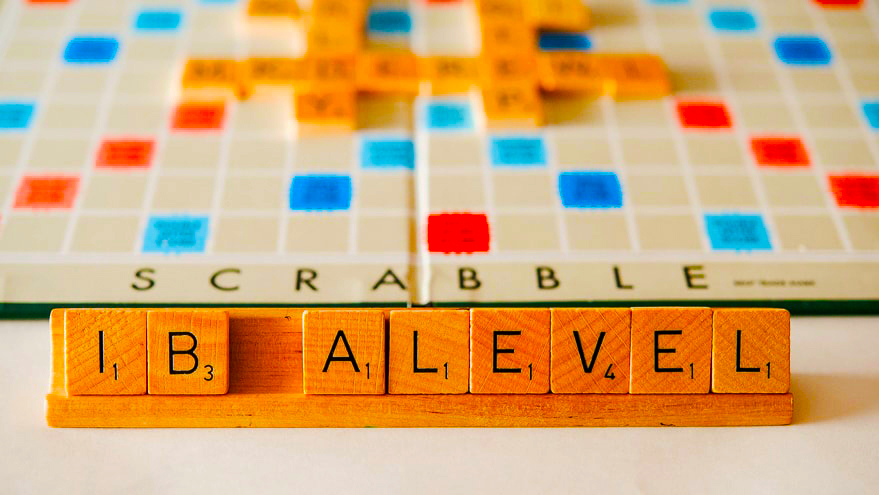
Right to Reply: A Levels Versus IB Qualifications? “Bombast”, “Bulldogs”, “Partiality”, “Personal Bias”, “Playing to the Gallery”, “Crude Binary Oppositions”… But, if Pushed… I Favour the IB…
Introduction and context. Bombast, Bulldogs, Partiality, Personal Bias, Playing to the Gallery and Crude Binary Oppositions.” But….the IB is (still) Better than A’ Levels…
The following is a letter forwarded to the Editor of SchoolsCompared.com from Matthew Farthing, Principal of Nord Anglia International School Dubai. Nord Anglia International School Dubai is an IB school offering the International Diploma Programme.
In his letter, below, Mr Farthing responds to a debate between school leaders and educationalists on the relative merits of British curriculum qualifications and those offered by the International Baccalaureate, with a particular focus on A levels and the IB Diploma.
The debate was inspired by a number of vociferous and keenly argued criticisms of British qualifications by IB school leaders in a leader written for SchoolsCompared.com.
What followed, in a subsequent article, was a rebuttal by well known and highly respected Principals from leading British schools, who argued that A levels should not be dismissed so quickly, and a verdict, by the Editor of SchoolsCompared.com which found, all things being equal, in favour of A levels.
Mr Farthing’s letter and response has not been edited and we have printed it without commentary.
The original articles and debates can be found here:
1. Supporting the International Baccalaureate curriculum and IB qualifications
Full article here.
2. Supporting the British Curriculum and A Level qualifications
The full article can be found here.
“This letter is written on the International Day of Tolerance which is highlighted on the road signs in Dubai today and serves as a healthy reminder of how we live in a society where diversity, tolerance and the complexity of contemporary citizenship are celebrated.
Yesterday, however, I read two articles in ‘Schools Compared’ that prompt me to write today; – articles that seem to prefer to polarise opinion, claiming emotional high grounds while invoking the absolute parental right to choose. As articles develop their case, first IB and then A levels the emotional stakes are further raised and the clarity of understanding wanes in direct proportion.
“A levels are Dead – The IB is the new gold standard, gloves off, school leaders advise”
headlines one while the other is even more absolutist:
“British A levels versus IB “Sensationalist Claptrap”. The big guns in UAE British Schools fight back. A levels are the proven gold standard qualification for universities and employers. No ifs, no buts’.”
Reviewing the language of the articles I am struck by the inflammatory style of the texts which, rather than supporting families on how best to navigate the complexity of deciding what pathways might best serve their children as they move into young adulthood, it encourages a drawing up of hard positions and prejudicial claims. Rather than truly helping where ‘ it is difficult for many of us as parents to differentiate between the IBD and A levels’ as claimed, images of death, and conflict, union jack flags, gold and scales of justice are provided instead.
There is no reference to other curricula either, American, French or Indian and there may even be some unconscious tacit understanding that this is an article all about British schools alone for British families in Dubai. I stress this because the one thing that all of our schools and both curricula, (IBD and A level) share, is that we all serve the most diverse community of families coming to Dubai from across the globe. Indeed, the success of the Diploma and A levels alike is to do with how well they are recognised as universal academic currency providing routes for matriculation into top universities in Dubai and across the world.
As a Principal, with over twenty years experience leading internationally British schools in Europe, the Middle East, South East Asia and China some with roots in A level and others in the IB Diploma, I call for us all to find the middle ground now rather than fall prey to bombast, bulldogs and crude binary oppositions.
“Schools and parents are hotly divided on the merits of the international baccalaureate system with its promise of a broad based curriculum, internationalist pretensions and more opportunities to find a student’s forte, versus the more focused A level system, steeped in decades of history and used as a model for learning around the world”.
This is an opening paragraph, it is most certainly eye catching and provocative, perhaps claiming the comfortably biased space for some readers to relax into but as all of the best schools will do, regardless of the curriculum award they are aligned to, we encourage time to explore the assumptions more deeply.
Are schools and parents really hotly divided? There are differences of opinion but one of the really special things that comes from working in British School Dubai in the time of Covid is the sense of confederate camaraderie, of sharing, and of respect for each.
What is this promise of a broad based curriculum? The IB simply requires students to choose six subjects within six subject groupings. It also requires the student to do more as well embracing the core that is the Extended Essay, Theory of Knowledge work and building a student portfolio that witnesses engagement with activities that are creative, active and service related.
With regards “internationalist pretensions”, I am not quite sure what this means. If I think about how we bring children up to understand diversity and their place in globalized communities I cannot see what might be wrong in this and let me assure you that the majority of our students fully understand the horrors of exclusion, the realities of continuing racial ( and other ) prejudice and of the fundamental importance of equality, diversity and inclusion.
For the sake of the discussion it may be worth transcribing the mission in full so that the ‘internationalist’ dimension can first be better understood if it is to be contested.
“The International Baccalaureate aims to develop inquiring, knowledgeable and caring young people who help to create a better and more peaceful world through intercultural understanding and respect. These programmes encourage students across the world to become active, compassionate and lifelong learners who understand that other people, with their differences, can also be right.”
While the aspiration may not be embraced by all I wonder what school, what teacher, what parent and most importantly, what student, would not aspire to this mission that can be accessed by all?
There are some very strong statements in the article which, although quite amusing to read, resemble the pattern of the after dinner speech or parliamentary style sixth form debate rather than a coherent explanation of the validity of both award structures. Is this what the parent, student and reader wish for and is this the supportive function of a professional site like ‘Schools Compared’ who, in this article have made it very clear that the winning of a debate is more important than the provision of impartial and non-judgmental advice which has always seemed to be the mandate that ‘Which School Advisor’ upholds if ‘Schools Compared’ in this case, does not.
Sadly, after the ‘Schools Compared’ author makes the bold statement “we promised not to sit on the fence” the partial conclusion follows seemingly burdened by the weight of personal bias, perhaps a desire to play to an assumed gallery, however conscious or unconscious that may be and without the objectivity that is deserved.
“In our view, with few exceptions, the IB does not allow children to choose the subjects to study that they are passionate about, are good at and enjoy in the depth which A Level does. More importantly, it requires students to study subjects that they may well not enjoy, not be good at and have no interest in because of its underlying ideological bias. Given the choice between two outstanding schools, one IB and One British A Level, we would, then… recommend the British A’ Level school. We think a British A’ Level education will, in almost every conceivable case, be the better choice for students. And so, just as perhaps always when it counts, the British bulldog comes out of the shadows when it matters most. “
There is much further detail that can be contested with evidence available to show that many of the claims are little more than unsubstantiated opinion and in relation to this I believe the best school leaders and admissions teams all share the same understanding, that joining a school is an extremely emotional affair and that we are in the business of helping families to choose the school and the curriculum award that is right for each individual student.
At NAS Dubai we spend time with individual students and their families as they come to the end of their GCSE years helping them to understand the pathways ahead and decide what may be best for each. Every year the familiar discussion begins and we have several families who have made their commitment to an A level pathway and we support them in that as we discuss and help them to best understand the choices that they are making.
With extensive experience of the merits and shortcomings of both award structures, I am often asked which curriculum structure I prefer and why. When asked I maintain that there are two overarching considerations, firstly what is right for the individual student as we (parents and school, know her/him) and secondly, what are the particular, less obvious features and personality of the school that will influence the character of the student concerned.
If I am pushed to make a definitive claim for either award as offering a fuller or a more relevant education with more transferable skills I favour the IB over A levels but a great school will provide a great education regardless of the curriculum it chooses and in respect of this I would tender the claim that all fellow Principals and Head Masters would say the same. So please, look for the great in your school of choice and explore more deeply what that ‘great’ may be.
When thinking through the notion of character development and asking how far does the school contribute to shaping the minds of the young adults it serves I would like to pause for a moment and ask to consider the moral value base of the School and how its students understand the foundations on which ideas are based. In respect of this I also do see how well a school can be held to account for the way it lives up to its mission reflecting the mission of the IB pursuing an educational service that is self-aware and open minded. TOK , the personal research that is Extended Essay and CAS most certainly do help the young adult mind understand the complexity and interrelatedness of learning while enjoying clear sight of the how and the why of the learning as well as the what.
However, as we live though the disruptions of Covid and transformations that ensue in education today, I sense we should all be aware of how we try to hold on to what we knew so well from before and that perhaps we need to take time to reflect and reform with professional responsibility.
Returning to the article I would like to draw attention to the very good sense that was expressed by one colleague was cited:
“If the recent COVID-19 crisis has taught us anything, it is that our children and future generations need to be prepared for volatility, uncertainty, complexity and ambiguity. The challenges of these times have allowed us to reconsider and begin to transform the why, what and how we educate our youth. The question to ask oneself is not so much “which is the best curriculum for my child?” but, rather, “which educational context is most likely to empower my child to flourish now – and succeed later in a rapidly changing world?”
All of the best school leaders are aligned on this as we consider the extraordinary realities and pace of change that we are living through and consider how well our schooling prepares our students for the worlds that they will inherit. Some of the best schools go far in their commitment to personalising learning and modifying both curriculum and approaches to learning to ensure that each student is best served. As we modify our curriculum offer to meet diverse needs, expectations, talents and interests we may also embrace the provision of different award bearing systems that are commonly thought of as being mutually exclusive. At NAS Dubai we are asking whether we can offer A levels as well as the IB Diploma and realise that if we do so then our further success will be to do with the quality of the overall sixth form school experience at NAS Dubai, not either award in isolation but a refined understanding of what it is to be a student in our school.
That discussion still has far to go and if we take as read high academic success regardless of the curriculum award we will go far deeper as we ask about the specific and particular values associated with our school upon which many different personalized learning pathways may run. Rather than asking about the shallows of the subject content and surface structure of the curriculum parents and students should be asking about its depth. The prompts below are familiar to any fine school and these are the sorts of questions to ask ourselves and for others to ask of us when exploring a particular curriculum:
- are we teaching wellbeing?
- are students learning leadership?
- do we exploit the local context that is Dubai
- how do we build on the social studies programme in our Sixth Form?
- how do we teach design thinking?
- how do we release talent for innovation and entrepreneurship?
- how do we teach healthy living?
- how do we foster student directed learning?
- how well do we give support when students access online degree courses, moocs and other complementary programmes delivered outside of the school?
- how do we develop a sense of philanthropy?
- what service projects are there?
- how do we foster intracultural understanding?
- how do we skill for digital agility?
- Is sustainability linked to all that we do?
- how well do our students own their learner profile?
- does the school community know itself as open-minded, creative enquirers?
- is it a place where staff and students alike are knowledgable and balanced thinkers ?
- does the school foster young people to be great communicators able to take risks and reflect on their learning?
- does the school interpret its curriculum in relation to a common value base that is shared by its parents, teachers and students alike.
Our curriculum offer in terms of the external award, A level of IB Diploma is but the tip of the melting learning iceberg. Results are crucial but in the changes we are living through we must now take the discussion so much further. We really must ask about how our schools prepares our students for the current world with all of its volatility, uncertainty, complexity and ambiguity taking strength from the health of our school communities with regards how well each embraces diversity, equality and inclusion.
There is such a much bigger picture than the recent articles reveal.
Let us all encourage the most healthy learning in all of our schools where their programmes, regardless of their curriculum award structure, really do
“… help to create a better and more peaceful world through intercultural understanding and respect. These programmes encourage students across the world to become active, compassionate and lifelong learners who understand that other people, with their differences, can also be right.”
This is the healthy ambition and a clear educational purpose that unites us all. Along the way, when our values are clear we easily achieve the amazing academic results for each and every student in our care as well whichever and whatever the award route that is being followed.”
Matthew Farthing. Principal. Nord Anglia International School Dubai. November 2020.













































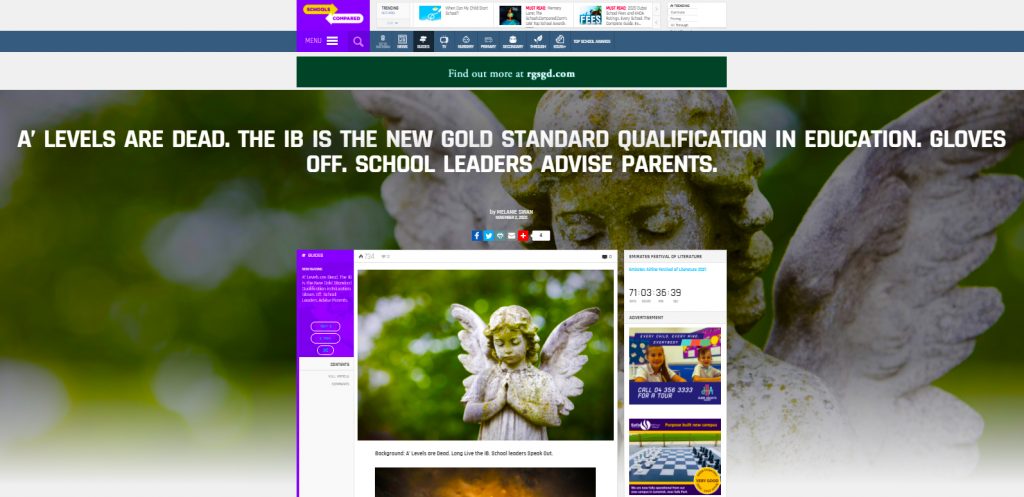
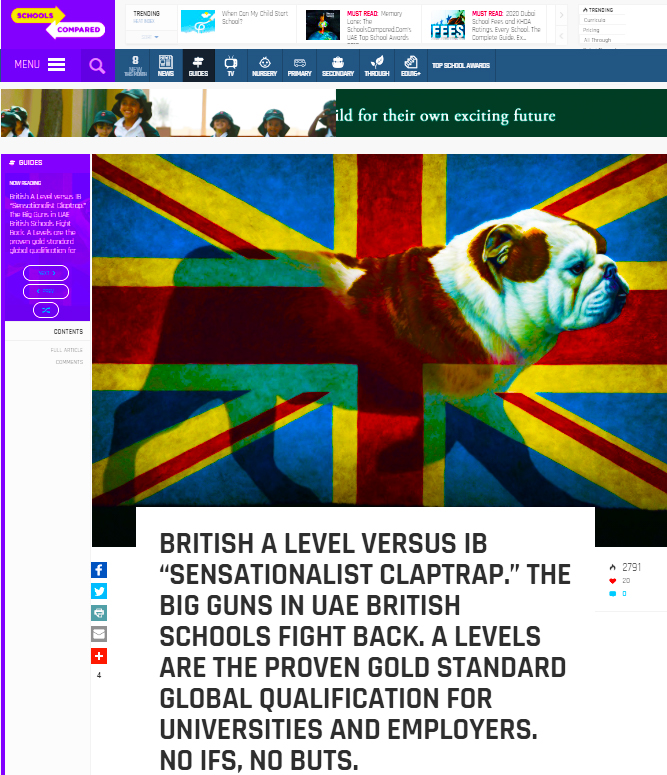








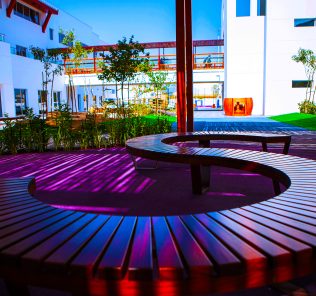
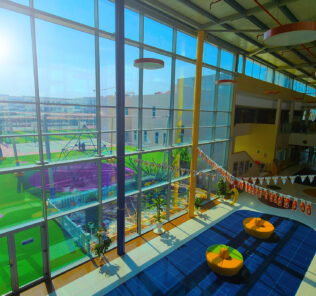

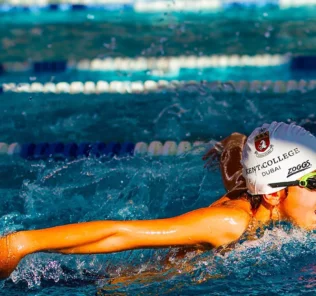












Thank you for sharing